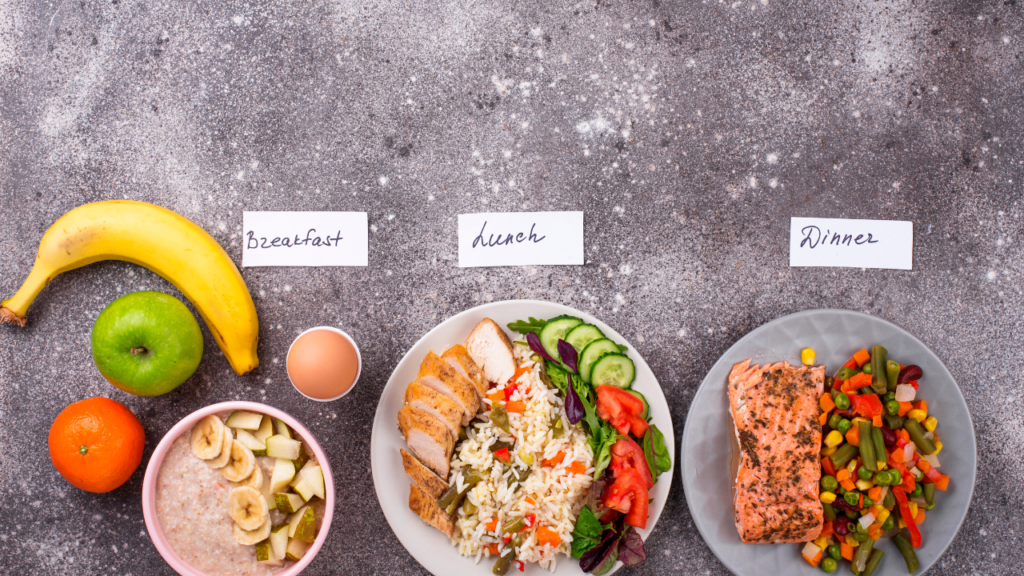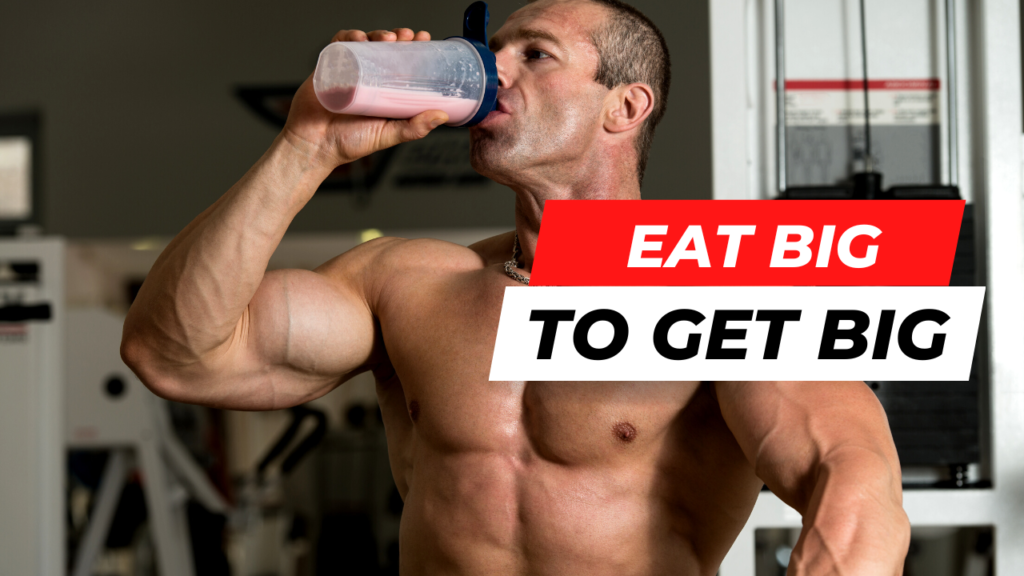Our website is supported by our readers. We sometimes earn a commission when you click through the affiliate links on our website at no extra cost to you.
Surely you’ve heard the saying, “You gotta eat big to get big”, right? There’s a lot of truth to that saying. In fact, eating more is one of the most important things you can do if you’re looking to gain muscle and strength.
Proper nutrition is crucial for building muscle and strength, and without enough food, your body won’t have the resources it needs to repair and grow muscle tissue. However, eating more isn’t as simple as just consuming more calories. To truly maximize muscle and strength gains, you need to focus on consuming the right types of foods and in the right quantities.
In this article, we’ll cover the key points you need to know about eating more for muscle and strength gains. I’m going to attempt to explain everything there is to know including: What types of foods you should be eating? How much you should be eating? And, when you should be eating?
What should I eat to gain muscle and strength?

When it comes to building muscle and strength, proper nutrition is just as, if not more important than your training routine. In order to support muscle growth, it is crucial to consume enough calories and protein.
A study published in the Journal of the International Society of Sports Nutrition found that consuming a high-protein diet, specifically in the form of meat, dairy, and egg-based proteins, led to greater muscle mass and strength gains compared to a lower-protein diet.
In addition to protein, consuming enough carbohydrates and healthy fats is also important for energy and overall health. In this section, we will discuss the different types of foods that are beneficial for muscle and strength gains, as well as how to properly structure your meals for optimal results.
Protein

Here’s the honest truth, If you can’t nail your daily protein intake, you’ll never see muscle hypertrophy.
Proteins are made up of amino acids, which are the building blocks of muscle fibers. When you lift weights, you create tiny tears in your muscle fibers. Your body then uses the amino acids from the protein you’ve consumed to repair and rebuild those muscle fibers, making them stronger and bigger.
Countless studies have proven that more protein = more gains. If that’s something you’re serious about, get ready to shovel in a lot more food than you’re used to. Protein specifically, aim for at least 0.8 and up to 1.5 grams of protein per pound of body weight per day. If you’re very active or training heavily, opt for the later number.
Good sources of protein include: meat, fish, eggs, dairy, and plant-based options like legumes, nuts, and soy products.
Carbohydrates
One of the biggest fallacies of modern dieting is the myth that carbohydrates are somehow the enemy of the human body.
Carbohydrates are a necessary macronutrient for building muscle and strength. When you eat carbs, they are broken down and are stored in the muscles and liver as glycogen. Glycogen just happens to be the primary energy source for high-intensity, short-duration exercise. When glycogen levels are low, the body may start to break down protein for energy, which can lead to muscle loss.
Consuming enough carbohydrates will help to maintain glycogen levels, ensuring that the body has the energy it needs to perform intense exercises and promote muscle growth.
Additionally, carbohydrates intake also helps to stimulate insulin which is an anabolic hormone that helps the body to create muscle and repair the muscle fibers after workout. Therefore, it’s important to include carbohydrates in your diet if you are looking to build muscle and strength.
Good sources of carbohydrates include: fruits, vegetables, whole grains, and starchy foods like potatoes, rice, and pasta.
Fats
If you still think fat in foods is evil, you probably grew up in the 70’s and 80’s. The fat-free marketing craze insisted that fats made you fat and therefore you should avoid it at all costs. Well unfortunately, that was all just a “fat” lie.
First of all, fats are a necessary macronutrient and provide energy for the body. Second, fats play a vital role in hormone production, including testosterone, which is important for muscle growth. Testosterone is an anabolic hormone that helps the body to create muscle and repair muscle fibers after workouts. Low levels of testosterone have been linked to decreased muscle mass and strength.
Fats also help to keep the body healthy by supporting the immune system and helping to reduce inflammation. They also contribute to the absorption of fat-soluble vitamins, such as vitamins A, D, E, and K. These vitamins are important for overall health, including maintaining strong bones and healthy skin.
In addition, fats help regulate a healthy metabolism and contribute to the feeling of satiety. That’s right, that craving for cupcakes you always have? You likely not eating enough fat.
Which isn’t that funny? All that time spent not eating fat is probably why you overeat and gain weight.
Good sources of healthy fats include: avocados, nuts, seeds, and fatty fish like salmon.
Interested to calculate your macros? Use this calculator.
How can I build muscle if I can’t eat a lot?
Eating a lot is not always necessary for building muscle. In fact, it is possible to gain muscle while eating less, as long as you are consuming enough protein and engaging in strength training exercises.
One strategy is to use supplements such as protein powders and meal replacement shakes. These can help you consume more protein and calories in smaller volumes of food.
Another strategy is to make the most out of smaller meals and snacks. For example, you can eat smaller, more frequent meals throughout the day to ensure that you’re consuming enough calories and protein.
How much should I eat a day to gain muscle mass?

The amount of food you need to eat to gain muscle mass will vary depending on your individual needs. A general guideline is to consume around 18-20 calories per pound of bodyweight, with a focus on consuming enough protein to support muscle growth. However, this may not be enough for those who are very active or have a high metabolism. In these cases, it may be necessary to consume more calories to see results.
It’s important to note that muscle gain is not just about eating more calories, but also about consuming the right types of foods. A diet high in protein and complex carbohydrates will support muscle growth, while a diet high in processed foods and added sugars can impede progress.
Yes, you should eat more if you have more muscle. Muscle tissue is more metabolically active than fat tissue, which means that it burns more calories at rest. As you gain muscle, your body will require more calories to fuel that muscle tissue, so you’ll need to eat more to maintain a calorie surplus.
Should I eat 3 meals a day to gain muscle?
Eating three meals a day is a common approach for gaining muscle, but it is not the only option. Some people prefer to eat smaller, more frequent meals throughout the day, while others prefer to eat larger meals less frequently. The key is to find a meal plan that works for you and that allows you to consume enough calories and nutrients to support muscle growth.
What happens if you lift weights but don’t eat enough protein?
If you lift weights but don’t eat enough protein, your body will not have the necessary building blocks to repair and grow muscle tissue. Protein is essential for muscle growth and recovery, and without enough of it, your progress in the gym will be limited.

Consuming enough protein is also essential to prevent muscle loss when dieting, as the body will turn to muscle tissue as an energy source if it is not getting enough protein from food.
What time of day should I eat to gain muscle?

There is some science to suggest that the timing of your meals can have an effect on muscle gain. However, the research is not conclusive and more studies are needed to fully understand the potential impact of meal timing on muscle growth.
One study published in the Journal of the International Society of Sports Nutrition found that consuming a post-workout meal containing both protein and carbohydrates within two hours of resistance exercise led to greater muscle protein synthesis compared to consuming the same meal four hours post-workout. This suggests that consuming a post-workout meal soon after exercise may be beneficial for muscle growth.
Another study published in the Journal of the Academy of Nutrition and Dietetics found that consuming a higher proportion of daily protein at dinner, rather than breakfast, led to greater muscle protein synthesis in older adults. This suggests that consuming a larger portion of your daily protein intake later in the day may be beneficial for muscle growth.
However, it’s important to note that these studies have some limitations and more research is needed to confirm the findings. Additionally, overall caloric and macronutrient intake, adequate sleep, and regular resistance exercise are still the key factors in muscle growth.
How much protein should I eat to gain muscle?
The recommended daily intake of protein for muscle gain is 1.6-2 grams per kilogram of bodyweight (0.73-0.9 grams per pound) for sedentary individuals and 2.2-3.4 grams per kilogram (1-1.5 grams per pound) for athletes and active individuals. However, individual needs may vary depending on factors such as activity level, muscle mass, and overall health.
Related Reading: The Best Whey Protein For Muscle Growth and Getting Lean
Should I eat every 4 hours to gain muscle?
Eating every 4 hours can be helpful for muscle gain, as it can ensure that your body is getting a steady supply of nutrients throughout the day. However, it’s important to remember that muscle gain is not just about eating more frequently, but also about consuming enough calories and protein throughout the day.
If you find that eating every 4 hours is not practical or feasible for your schedule, it’s better to focus on consuming enough calories and protein in your meals rather than stressing over meal timing.
Why do bodybuilders eat 6 meals a day?
Bodybuilders are unlike the casual gym-goer. Their one and only goal is to pack on insane amounts of muscle mass. To do so requires one to consume an ungodly amount of food and spend an exorbitant amount of time lifting heavy weights.
While we all desire a chiseled physique, akin to a Greek god, the strict dietary requirements are next level. Sure, eating piles of meat sounds like a dream, but it’s a lot more challenging than you think.
Phil Heath, a professional bodybuilder says, “You’re not necessarily eating for taste, you’re eating for function…“
Bodybuilders eat 6 meals a day to not only help them consume more calories, but make it more tolerable to get in enough protein throughout the day. Eating more frequent, smaller meals prevents hunger and makes it easier to consume a large amount of food.
Final Thoughts
So there you have it. As you can see, there are a lot of questions revolving around eating and building muscle and strength. The two go hand in hand and the bottom line is this: strength training requires proper nutrition.
Consuming enough calories and protein is essential for muscle growth. The timing and frequency of meals, as well as the types of food consumed, also play a role in muscle growth. It is important to listen to your body, and adjust your diet accordingly.
Don’t be afraid to eat more, but make sure you are eating the right types of food to support your muscle-building goals. Keep in mind that everyone’s body is different, so it may take some experimentation to find the best diet plan for you. Remember that the key to success is consistency and patience.
Keep up the good work and don’t give up!
The authors and editors that comprise the Recovatech Team have 20+ years of combined experience and knowledge covering the topics of strength, fitness, and recovery. We are impassioned in our pursuit of presenting the most up-to-date information on strength training, cardio fitness, physical rehab, functional movement, nutrition, workout recovery, and best-in-class reviews. Should you feel inclined, please reach out to us at admin[at]recovatech.com.


